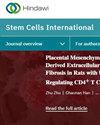Shikonin Induces Glioma Necroptosis, Stemness Decline, and Impedes (Immuno)Proteasome Activity
IF 3.3
3区 医学
Q2 CELL & TISSUE ENGINEERING
引用次数: 0
Abstract
Gliomas, the most prevalent primary intracranial tumors, exhibit notable features such as heightened malignancy, rapid recurrence, and elevated mortality rates. Presently, standard therapeutic approaches yield limited curative outcomes. Shikonin, an extract derived from traditional Chinese medicine, demonstrates notable bioactivity against various tumors, including gliomas. This study elucidates Shikonin’s capacity to effectively induce necroptosis in glioma cells, concurrently mitigating glioma stemness, as evidenced by diminished levels of stem cell markers, namely SOX2, CD44, CHI3L1, and CD24. Our findings indicate that Shikonin-induced programed necrosis leads to a downregulation of proteasome activity and a decrease in the expression of immune proteasome subunits PSMB8/9/10 and PSME1/2/3, contributing to the attenuation of stemness in gliomas. This study comprehensively investigates the interplay between (immuno)proteasome dynamics, Shikonin-mediated necroptosis, and the consequential reduction in glioma stemness, both in vitro and in vivo. The discussion extends to the potential of Shikonin as a promising therapeutic agent in the management of gliomas, offering a novel avenue for drug development in this challenging clinical context.志贺宁诱导胶质瘤坏死、干性衰退并影响(免疫)蛋白酶体活性
胶质瘤是最常见的颅内原发性肿瘤,具有恶性程度高、复发快、死亡率高等显著特点。目前,标准治疗方法的疗效有限。从传统中药中提取的石杉碱甲对包括胶质瘤在内的各种肿瘤具有显著的生物活性。本研究阐明了Shikonin有效诱导胶质瘤细胞坏死的能力,同时减轻胶质瘤的干性,这体现在干细胞标志物(即SOX2、CD44、CHI3L1和CD24)水平的降低。我们的研究结果表明,Shikonin诱导的程序性坏死会导致蛋白酶体活性下调,免疫蛋白酶体亚基PSMB8/9/10和PSME1/2/3的表达减少,从而导致胶质瘤干性的减弱。本研究在体外和体内全面研究了(免疫)蛋白酶体动力学、Shikonin介导的坏死和由此导致的胶质瘤干性减弱之间的相互作用。研究还探讨了Shikonin作为神经胶质瘤治疗药物的潜力,为在这一具有挑战性的临床环境中开发药物提供了一条新途径。
本文章由计算机程序翻译,如有差异,请以英文原文为准。
求助全文
约1分钟内获得全文
求助全文
来源期刊

Stem Cells International
CELL & TISSUE ENGINEERING-
CiteScore
8.10
自引率
2.30%
发文量
188
审稿时长
18 weeks
期刊介绍:
Stem Cells International is a peer-reviewed, Open Access journal that publishes original research articles, review articles, and clinical studies in all areas of stem cell biology and applications. The journal will consider basic, translational, and clinical research, including animal models and clinical trials.
Topics covered include, but are not limited to: embryonic stem cells; induced pluripotent stem cells; tissue-specific stem cells; stem cell differentiation; genetics and epigenetics; cancer stem cells; stem cell technologies; ethical, legal, and social issues.
 求助内容:
求助内容: 应助结果提醒方式:
应助结果提醒方式:


